Reptile & Amphibian
News Blog
Keep up with news and features of interest to the reptile and amphibian community on the kingsnake.com blog. We cover breaking stories from the mainstream and scientific media, user-submitted photos and videos, and feature articles and photos by Jeff Barringer, Richard Bartlett, and other herpetologists and herpetoculturists.
Friday, April 25 2025

Late last session, Rep Betty McCollum (MN) introcuded a bill to " “To amend the Animal Welfare Act to include cold-blooded species as animals, and for other purposes.” That bill died with the close of the last session, but this week she reintroduced as HR2976 and we can only guess that it will have the same wording.
The nitty gritty from the USARK Web Alert is:
This bill, which should be identical to last session’s introduction, adds reptiles, amphibians, fish, and cephalopods as “animals” under the Animal Welfare Act (AWA), meaning the U.S. Department of Agriculture (USDA) must develop new regulations. Basically, the USDA would now be required to license and inspect facilities and breeders with these animals. Businesses would need to comply with the new USDA regulations. The USDA began inspecting and licensing aviculturists (bird breeders) in 2024 (for new licensees). The bill has been assigned to the House Agriculture Committee. We will post more information when available.
You can find the wording of the original bill here. While we are unsure of the wording exactly of the new bill, this gives a good guess as to what will come. As always, you know there is strength in numbers, so be sure to join and keep up with our friends at USARK.
Tuesday, March 11 2025

There is an update to the proposed South Carolina Venomous Ban. The meeting is being held next week. This is a proposed STATEWIDE ban. From the USARK update:
This bill is scheduled to be heard by the Wildlife Subcommittee on Wednesday, March 19th at 12:30 PM. The location is: Blatt Building Room 409, 1105 Pendleton St, Columbia, SC 29201. Written testimony should be emailed to EllieHayes@schouse.gov. You can also email to register to speak. Send another comment even if you have already done so, and any stakeholders should attend the hearing to oppose in person. Read the agenda at https://www.scstatehouse.gov/agendas/126h15107.pdf
Just a reminder that they are including a grandfather clause for current owners who can register their animals and receive permits within 90 days of the law going into effect. There are exemptions included for research facilities and zoos as well.
The proposed banned list is:
Venomous reptiles banned, including hybrids: families Elapidae, Crotalidae, Viperidae, and Hydrophiidae; all reptiles in the genus Heloderma; all reptiles in the family Colubridae belonging to the genera: Rhabdophis, Balanophis, Macropisthodon, Boiga, Dispholidus, Thelotornis, and Thrasops, and all reptiles in the family Atractaspididae.
USARK has supplied sample letters as well as all the contact information in their action alert which can be found here.
Friday, February 7 2025

As expected, likely in response to the irresponsible owner with the Taipan who was bitten in 2024, the state of South Carolina is now proposing a state wide venomous Ban. They are including a grandfather clause for current owners who can register their animals and receive permits within 90 days of the law going into effect. There are exemptions included for research facilities and zoos as well.
The proposed banned list is:
Venomous reptiles banned, including hybrids: families Elapidae, Crotalidae, Viperidae, and Hydrophiidae; all reptiles in the genus Heloderma; all reptiles in the family Colubridae belonging to the genera: Rhabdophis, Balanophis, Macropisthodon, Boiga, Dispholidus, Thelotornis, and Thrasops, and all reptiles in the family Atractaspididae.
USARK has supplied sample letters as well as all the contact information in their action alert which can be found here.
Thursday, January 9 2025

In 2016 the US Fish and Wildlife Service published a temporary rule on 201 Salamander species and as of this January that rule is finalized. The 201 species covering 16 genre are now listed as injurious under the Lacey Act meaning they no longer can be imported into the country or transport or sold across state lines in the US. From the USARK Alert:
The interim rule applies to all species in these 16 genera: Ambystoma, Andrias, Aneides, Aquiloeurycea, Calotriton, Chiropterotriton, Cryptobranchus, Desmognathus, Ensatina, Eurycea, Laotriton, Ommatotriton, Pachytriton, Proteus, Pseudobranchus, and Pseudotriton.
...
Comments on the interim rule regarding newly added species can be made after January 10, 2025, for 60 days (deadline March 11) at https://www.federalregister.gov/public-inspection/2024-31203/injurious-wildlife-species-listing-salamanders-due-to-risk-of-salamander-chytrid-fungus.
Find the original Salamander Rule species list (201 species in 20 genera) at https://www.fws.gov/page/list-of-salamanders-designated-as-injurious.
You can read the full action alert here on USARKs page.
Tuesday, November 19 2024

In a move that will shock no one, the first what we can assume will be many laws relating to the Leibowitz/Taipan bite case has happened. Florence, S.C. has released new proposed exotics laws that impact more than reptile owners. From the USARK Action alert the proposed banned reptile portion is:
Crocodilians twelve (12) inches or larger;
Large, dangerous, or potentially invasive constricting snakes including reticulated pythons, python reticulatus;
urmese/Indian rock pythons, python molurus; rock pythons, python sebae, and anacondas, eunectes murinus (green anacondas);
Venomous/poisonous reptiles, amphibians, or serpents;
You can read the full action alert on USARK's page here.
Now one thing of note is the snake law is somewhat vague and can be easily adjusted to include any larger snake unfortunately. Simply using the wording large, dangerous OR rather than AND is hugely problematic from someone who has worked in animal control and seen how people will twist those words, but that is just my opinion and experience. I would expect to see far more of these laws popup in South Carolina over the next year. The damage one person can do to our hobby is immense.
Monday, February 12 2024

USARK has issued an absolutely terrifying action alert for Arizona that all animal owners need to be aware of. Please spread the word far and wide. There are almost two identical senate bills being introduces which allow for warrentless search of private property and immediate seizure of animals without cause. What does that mean? USARK explains:
Remember, warrants protect us from unreasonable governmental intrusion. As if that is not bad enough, the bills would make it so that, “The formal rules of evidence do not apply and reliable hearsay is admissible in the postseizure hearing.” Please read that last sentence again! “The formal rules of evidence do not apply and reliable hearsay is admissible…”
First, the formal court rules are tossed out the window. This means that the due process that typically exists in court does not apply. Additionally, hearsay is generally inadmissible in court unless a special exception is provided because it is not considered reliable or trustworthy. If this bill passes, hearsay will be good enough for the seizure and State possession of animals in Arizona. Needless to say, this goes against our constitutional rights as Americans.
We know from what we have seen in Florida what happens when government has too much power, healthy innocent animals that could be relocated and rehomed die violently on video for all to see. SB1204 has a hearing on Thursday, February 15 with the Senate Natural Resources, Energy and Water Committee. Please share this with everyone you know in Arizona. Visit USARK page HERE to learn more and keep up to date. Also JOIN USARK. Membership matters. Our numbers count! We will keep you up to date here as well!
Friday, December 29 2023
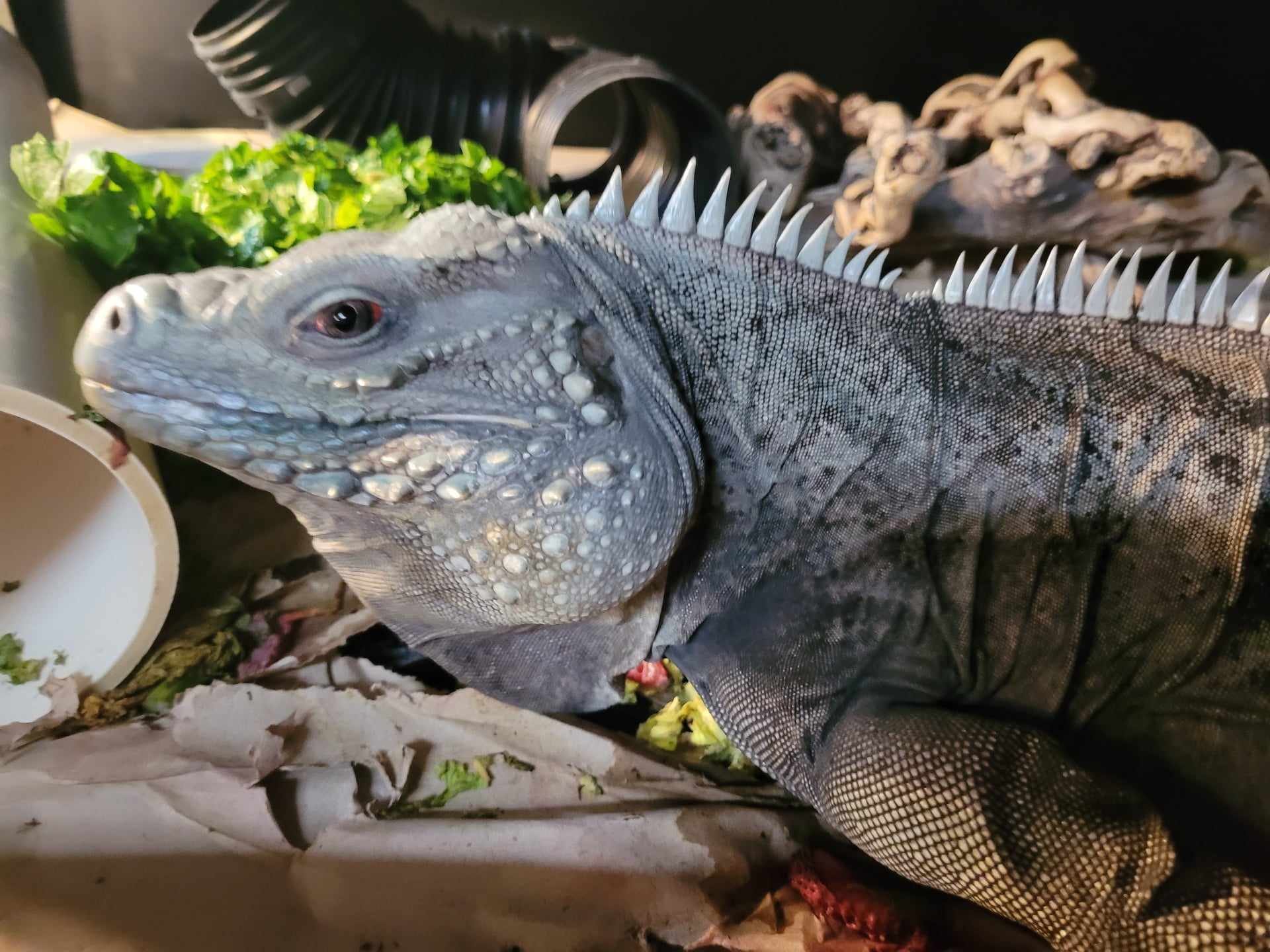 Photo of Gideon, a Grand Cayman hybrid bred by Ty Parks in FL, but living his best life safe in WIsconsin - Cindy Steinle
Photo of Gideon, a Grand Cayman hybrid bred by Ty Parks in FL, but living his best life safe in WIsconsin - Cindy Steinle
Recently, the State of Florida deemed all Green Iguanas ( Iguana Iguana) as a restricted species and created quite a stir, confiscating animals from even private zoos and killing the animals rather than allowing them to be rehomed or allowed to remain on display at the zoo. Now in a move to destroy the reptile industry further, Florida Fish and Wildlife is making the move to change the language from Iguana (Iguana Iguana) to simply Iguana. This would thus include all species including Cyclura and Ctenosaura most definitely but potentially all species under the family Iguanidae which would also include Amblyrhynchus, Brachylophus, Cachryx, Conolophus, Dipsosaurus, and Sauromalus as well.
This is not only bad for pet owners and breeders, but seriously detrimental to worldwide conservation efforts as many assurance populations of a variety of both Cyclura and Ctenosaura species are maintained safely in Florida.
Read the update after the jump or click here to be taken to USARKFL's notice! There is also a link to the bill after the jump.
Continue reading "ACTION ALERT FLORIDA: Florida moves to include all species of Iguanas as restricted species"
Tuesday, April 11 2023
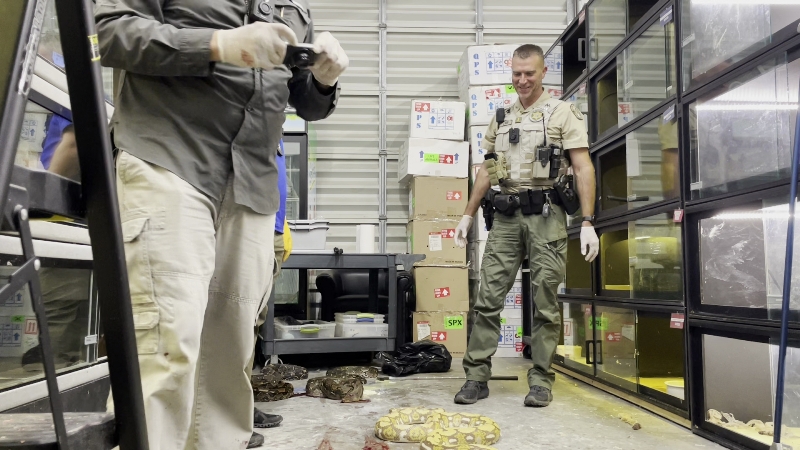 An FWC officer smiles as he surveys the scene after the killing of 34 pythons and a pregnant pet boa by FWC officers (Photo by Chris Coffee, who has granted permission for this photo to be published and disseminated)
An FWC officer smiles as he surveys the scene after the killing of 34 pythons and a pregnant pet boa by FWC officers (Photo by Chris Coffee, who has granted permission for this photo to be published and disseminated)
In 2021, Florida changed their ownership laws but promised that pet owners were able to keep their animals for the lifetime of the animals. Breeders stopped breeding and started moving animals out of fear of repercussions. Animals that were legally owned under a "Conditional Species Permit" were now considered illegal, however according to FWC, they were grandfathered in for the rest of their lives and could live out their lives in their current homes.
"I want to make sure the public's aware that if you currently own one of these reptiles, you're allowed to keep it until it's death. So no one is telling you you have to get rid of your pet or euthanize it and no one from the state is going to take it from you." Rodney Barreto , Chairman - Florida Fish and Wildlife Conservation Commission - Public commission meeting February 25, 2021
"Their pets are their pets and they are going to continue to be their pets and we made sure that it was very clear." - Mike Sole, Former Vice Chairman - Florida Fish and Wildlife Conservation Commission, Public commission meeting February 25, 2021
Continue reading "Holy Thursday Massacre: The Killing Fields of Florida"
Thursday, October 6 2022

A new ordinance is looking at being passed in Sioux City, IA that limits all animals in a household to three. Typically in the past these types of laws applied solely to dogs and cats, but the city restructured the definition of domestic animals and it applies to almost everything. From the USARK Action Alert:
Sioux City is taking steps to severely limit the number of animals that can be owned by its residents by redefining the term domestic animal (which currently only includes dogs and cats). As redefined, it would include most animals and limit the number per household to no more than three pets in total. This ban narrowly passed its first reading (3-2) so not all Council members approve of this legislative abuse. Local residents must voice their opposition immediately as the next reading and vote are scheduled for Monday, October 10.
...
The only pets excluded from this new ban would be hamsters, guinea pigs, and fish. It would be legal to have 300 hamsters but illegal to have three crested geckos or three lovebirds. Regardless of the species, the numbers assigned to these “pet limits” are completely arbitrary and capricious with no logical or scientific grounds to argue the merit. One person may responsibly and humanely care for seven dogs while another person may not be able to responsibly have one dog. The problem is isolated to the bad owners and not how many pets people have. Punishing responsible animal owners by claiming it will stop irresponsible actions by others is bad government at its finest through collective punishment.
For more information, please visit the USARK action alert page here.
Saturday, July 30 2022

In yet another victory on behalf of the reptile community by USARK, the changes to the Lacey Act hidden deep in the America COMPETES act in the "CHIPS-Plus" bill have been removed!
For months USARK lobbied and members of the reptile community contacted their representatives and it worked! For now, there will be no changes to the Lacey Act.
From USARK:
We have been posting relevant updates on our main alert here (scroll down). To be brief, the “CHIPS-Plus” bill that passed in the Senate passed the House on 7/28 (243-187 vote). This bill includes some of the technology initiatives included in the America COMPETES Act, USICA, and other bills. The portions of COMPETES that were not germane to the intent of the bill (including the bad Lacey Act amendments) were not added to the CHIPS-Plus package. This should be the end of any threat from these Lacey Act amendments for this Congressional session.
For those who spent the past few months messaging, calling and writing letters, YOU DID IT! And a HUGE thank you to USARK!
Monday, July 11 2022

New changes to state law could impact some keepers in Alabama. The state however has opened a comment period until August 4th where you can lodge objections. Some of the more important changes to be aware of:
-Makes all king snakes (Lampropeltis spp.) and hybrids illegal to own, breed, and sell without a scientific collection permit or permit from the Commissioner. Currently, only Eastern, prairie, and black “speckled” king snakes are listed.
-Makes it illegal to own more than one box turtle (all Terrapene spp.) or sell/trade a box turtle without a scientific collection permit or permit from the Commissioner.
-There are other new rules including, but not limited to, additional protected nongame species and Eastern diamondback rattlesnake regulations.
As always, the folks at USARK have made it simple to respond. They have all the contact information and a template here. You can read the full proposal here.
Friday, July 8 2022
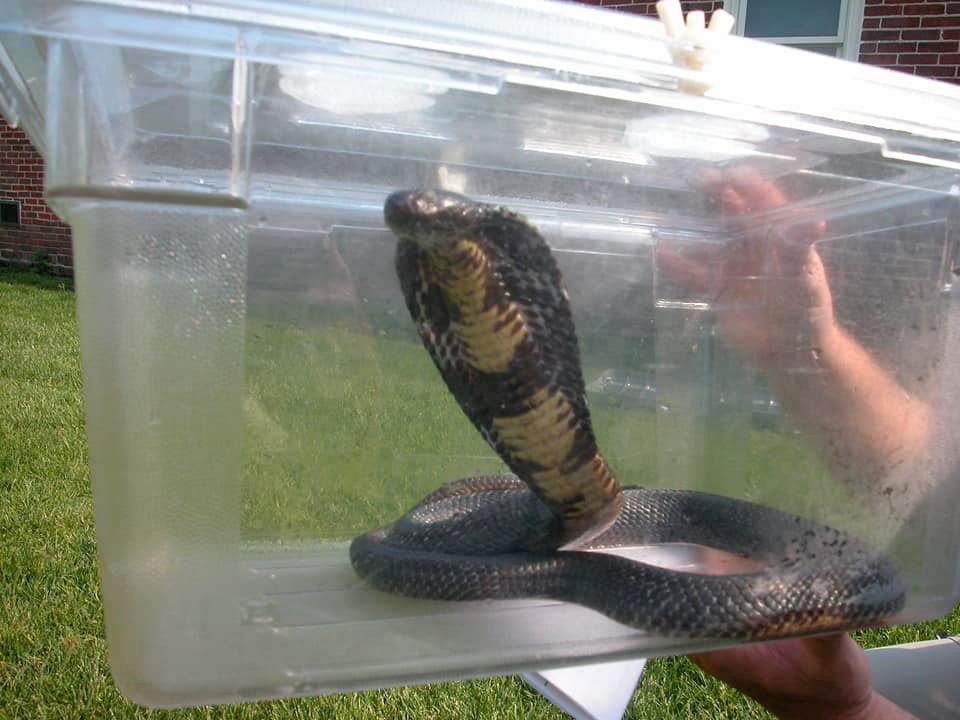
Although it does include a grandfather clause for current owners, the new law passed this week in Raleigh, NC is quite restrictive.
Spurred on by a viral loose spitting cobra last year, the city council passed a new law banning
Under the ordinance, keeping a pet from a species considered a “dangerous wild animal” will be prohibited within city limits.
A “dangerous wild animal” is considered by the city to be “any non-domesticated animal, which is normally found in the wild state, is inherently dangerous to person or property, and which generally does not live in or about the habitation of humans.”
The city’s definition includes “medically significant snakes.” The city defines those as any snake whose venom can cause death, serious illness, or injury. It also includes snakes whose venom would require emergency room care or immediate care of a physician.
The law does include a grandfather clause for current owners of animals this may apply to. You must register your animals before July 1, 2023. However be ready, the law goes into effect in two months!
These are the extensive requirements for the grandfather clause:
- Detailed inventory of animals with descriptions and photo(s) of animals
- Requirement to notify the City when the animal is moved to another location
- Plan for transfer of ownership or destruction if owner can no longer care for the animal
- Maintain health records of the animal
- Proof of ownership, such as a bill of sale
- Certifies that owner will only keep up to 10 medically significant venomous snakes
- Must possess liability insurance
- Will immediately report the escape of any dangerous wild animals in their possession
A criminal background check would also be required to ensure owners don’t have any previous felony charges or convocations of animal abuse.
To read more, visit CBS17
Inset image courtesy of Bob B. Chicago Herpetological Society Rescue Program.
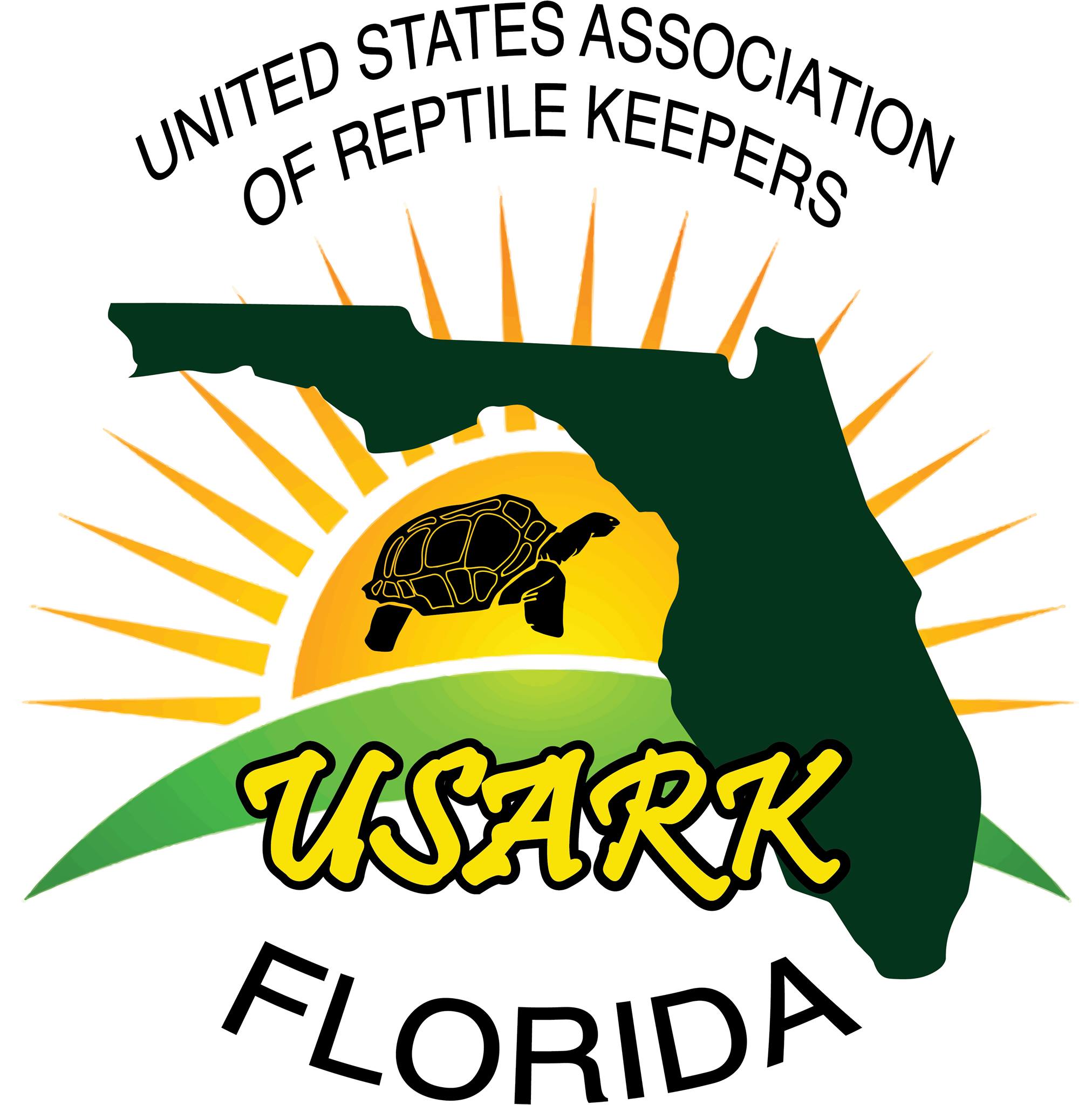
There are several issues that USARK-FL is currently dealing with in Florida that they need the help of Florida Residents.
First up is a rule requiring owners to report all injuries from their animals to the authorities. This opens your medical files to the government and could also be used as violations against you. You can read more about that here This rule is coming up for a vote at the FWC meetings next week. You can learn more about attendance here.
There is also the ongoing issue of the white list and banned animals in Florida. From their most recent alert, which can be read here:
From Kristen Penney Sommers of FWC to USARK FL President Elizabeth Wisneski on June 9, 2022:
"Per our discussion yesterday, the attached list is a repository of species that we have either had risk work completed on, or species that have been suggested to have risk work conducted on. In no way is this the “white list” that your members are claiming. One of the duties of the Nonnative Fish and Wildlife program is to evaluate the risk of species that may be introduced into the state. This spreadsheet is in part documentation of our efforts to address responsibilities to all of the citizens in Florida."
While use of the term "White List" was discouraged by Sommers and other FWC staff at the last "Technical Assistance Group" (TAG) meeting, FWC did introduce the terms "Unrestricted List," "Restricted List," and "Not Allowed List."
If you are a Florida herper, you really need to follow and join USARK-FL to keep abreast of the ever changing legal environment!
Friday, March 25 2022
Monday, February 7 2022

The America COMPETES Act has passed the house on a very slim vote. It is imperative that each and everyone one of us reaches out to our senators to oppose the passing of this act. This will impact more than just reptile owners. IF your pet could survive in the everglades, your pet could be next. This measure does not ban ownership, however it bans transport across state lines. While this may be primarily aimed at the trade and sale, it will also effectively end the ability to keep your pets if you move out of state or even if your vet is in another state, you could not take your pet to receive veterinary care it needs. USARK has sample letters, directions on how to get your letter into your senator's hands.
We added a portion of the original action alert after the bump with the info you need or you can visit USARK's info page here.
Continue reading "ACTION ALERT: NATIONAL: American COMPETES act to add species to Lacey Act"
Tuesday, February 1 2022

USARK recently caught a few amendments being hidden in the 2000 page plus America COMPETES Act of 2022.
This brief run down of what could be impacted can be found on USARK's page.
1. Provide that the Lacey Act bans the interstate transport of species listed as injurious. Specifically, it replaces Lacey’s current language ‘‘shipment between the continental United States’’ with ‘‘transport between the States.”
2. Create a “white list” of species that can be imported. This means that any animal (reptile, amphibian, fish, bird, mammal, invertebrate) that is not on the white list is by default treated as an injurious species and is banned from importation.
3. Create a new authority allowing FWS to use an “emergency designation” that becomes effective immediately after being published in the Federal Register unless an extension of no more than 60 days is allowed. That means no due process, public input, hearings, advanced notice, etc. for injurious listings.
4. Permit FWS to not allow importation if a species has not been imported in “minimal quantities” (to be defined) in the year prior to the enactment of this Act.
The effective date would be one year after the enactment of this Act.
This can and will impact more than just reptiles, so reach out to your friends and family that own things other than your normal dog and cat. If a species can survive in Florida, it may be targeted. Once a species is listed as injurious crossing state lines with the animal becomes illegal, even if it is for you to move OR going to a veterinarian! You will still be able to own it. However this also can impact our trade as well. This is is far more restrictive than the originally proposed "Big 5" that USARK was able to overturn with a lawsuit.
What can you do? USARK has given us everything we need! From their action alert:
Through Feb. 2, contact the House Rules Committee and your federal Representatives. Remember to be civil and professional at all times. Please personalize/edit your letters, if possible. If the bill passes the House with the amendments, then attention must turn to the Senate.
1. Call your Representatives’ offices (link below) and the Rules Committee at (202)-225-9091;
2. Email Representatives (link below);
3. Fax letters to (202)-226-9191 and your Representatives;
4. SHARE this and encourage others to complete the Alert!!!
The page also includes ways to find out who your representatives are as well as a form letter that you can copy and paste. You can find the action alert here.
Tuesday, March 2 2021

Two Texas bills are currently working their way through the legislature that will update the names in their existing law. This change is including the Burmese Pythons, which were previously considered a subspecies of Python molurus on their listing to full species status. Be aware, this is already a law and it is just an update to the nomenclature.
Below is the list of species included in the regulation that requires a TP&W permit. There are two permits available: one for possession and one for commercial business This is already law! The bill just adds the Burmese python and hybrids to the list. Bold text is the new language:
(a) The commission by rule shall establish permits that allow permit holders to possess or transport in this state a live nonindigenous snake, including a hybrid of any kind, that is:
(1) venomous; or
(2) constrictor that is one of the following:
(A) African rock python, Python sebae;
(B) Asiatic rock python, Python molurus;
(C) Burmese python, Python bivittatus;
(D) green anaconda, Eunectes murinus;
(E) reticulated python, Python reticulatus; or
(F) southern African python, Python natalensis.
The bill also adds this text:
(c) If it is shown at the trial of the defendant for a violation of this subchapter or a rule adopted under this subchapter that the defendant has engaged in a commercial activity without holding a required permit and the defendant has been previously convicted of a violation of this subchapter or a rule adopted under this subchapter, on conviction the defendant shall be punished for a Class B Parks and Wildlife Code misdemeanor.
For more information, visit the USARK page on this here.
Monday, March 1 2021

Recently New York State has proposed wide sweeping legislation preventing shipping of animals by "any mail carrier", which would also include frequently used outlets such as FexEx and UPS, which both allow the shipment of live animals with rules and restrictions. This includes shipping both to and from the state and aims ban the shipping of all mammals, birds, reptiles, and amphibians.
USARK has already set up a page including contact information for all legislative representatives involved and even a sample letter for you to personalize. You can read the full bill and access all needed information on USARK's page for New York here.
Be sure at all times to remain calm and polite when reaching out to representatives on this matter.
Saturday, February 27 2021
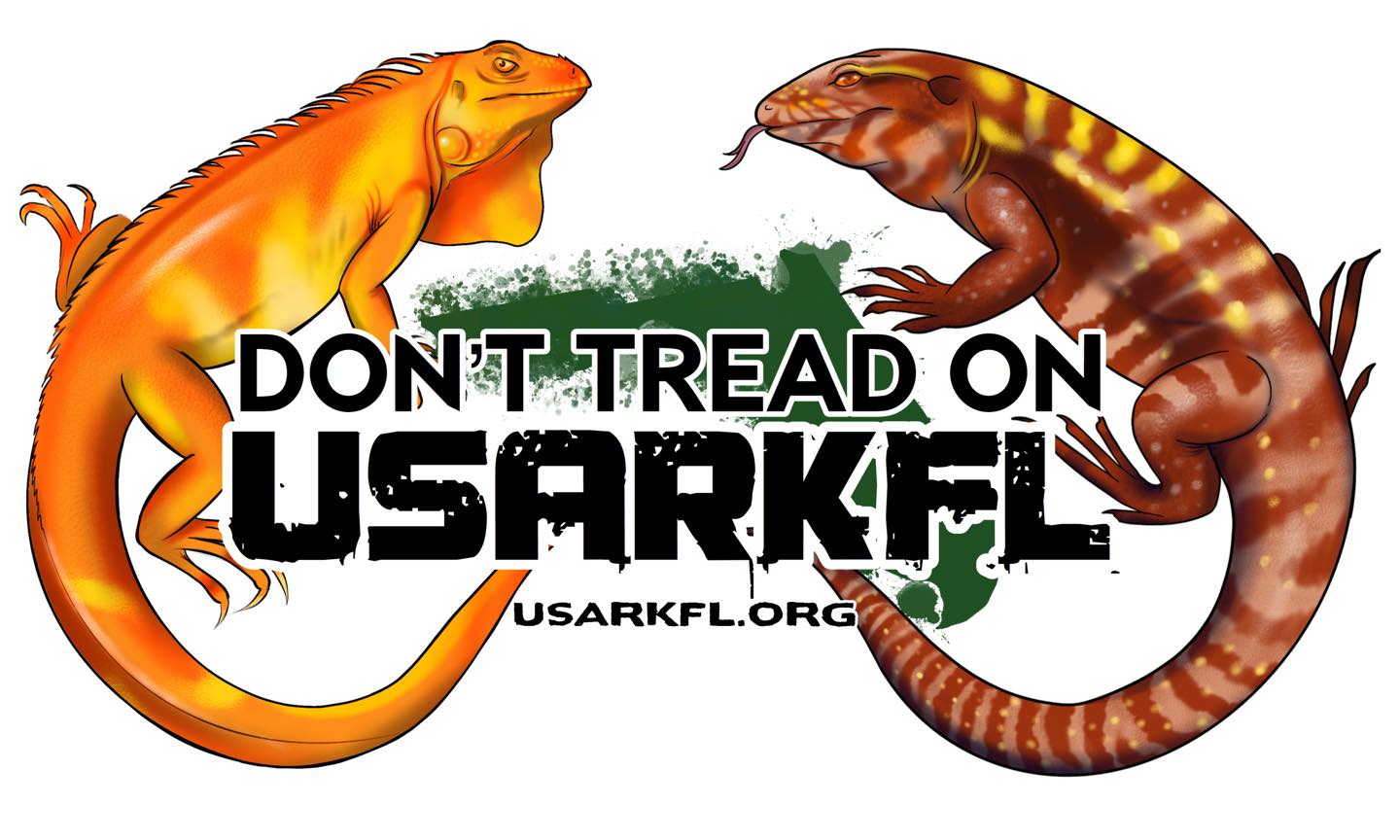
The Florida Fish and Wildlife commission has moved ahead with their proposed rule change regarding a variety of species from Iguanas to Anaconda. This includes a ban on ownership of several species. If you already own these animals, there are a variety of changes in your ownership, but you still make keep the animals. The species impacted are:
Green iguana (Iguana iguana)
All Tegus (genera Salvator and Tupinambis, all species)
Reticulated python (Python reticulatus)
Indian and Burmese python (Python molurus and Python bivittatus)
Northern African python (Python sebae)
Southern African python (Python natalensis)
Amethystine python (Morelia amethistinus)
Scrub python (Morelia kinghorni)
Green anaconda (Eunectes murinus)
Nile monitor (Varanus niloticus)
USARKFL has a breakdown of restrictions, including ownership, breeding and sales info here.
Be sure you are following USARK to help fight future legislation.
Sunday, February 21 2021

We have an urgent action alert from USARK regarding the return of the "animal program ban" that has returned in Illinois. As it is written, it could end even the most common of after school educational programs. From USARK:
This bill bans much more than lions jumping through rings of fire. It is a ban on taking a Greek tortoise into a classroom for an educational program about reptiles. It is a ban on taking a ball python, a red-eyed tree frog, a parakeet, and a hedgehog into a library for an educational show discussing the differences between reptiles, amphibians, birds, and mammals. It is a ban on llamas and any other non-traditional livestock at the State Fair or county 4-H fairs. Basically, if an animal non-native to Illinois is placed into a vehicle and taken to any location where someone will see it, other than a veterinarian in a private room, then it would become an illegal activity, and you a criminal. You could receive a year in jail and a $2,500 fine for taking a leopard gecko into your child’s classroom for a presentation.
The Chicago Herpetological Society hosts the largest and oldest hands-on reptile exhibit in the country. It reaches tens of thousands of people annually and this bill could destroy it. It could end programs coming to your child's school, day care or scouting program. The impact to the reptile community in Illinois would be devastating.
USARK has detailed instructions for reaching out to representatives and what we as a community can do here.
Friday, December 4 2020
 On December 1, 2020 House Bill 6455 (HB6455) was introduced in Michigan that could impact many reptiles keepers. The reptile portion of the bill does primarily impact ownership of venomous, crocodilians and some monitor species. While it is not an outright ban and offers provisions for owners to keep their pets, it can have very far reaching implications.
The reptiles impacted by the Bill are:
“Dangerous reptiles” per HB6455:
(I) A member of the order Crocodilia, including, but not limited to, an alligator, crocodile, gharial, or caiman.
(ii) A member of the family Atractaspidae.
(iii) A member of the species Dispholidus typus of the family Colubridae.
(iv) A member of the family Elapidae, including, but not limited to, a cobra, mamba, krait, coral snake, or Australian tiger snake.
(v) A member of the family Hydrophiidae, including, but not limited to, a sea snake.
(vi) A water monitor or crocodile monitor.
(vii) A member of the family Viperidae, including, but not limited to, a rattlesnake, cottonmouth, bushmaster, puff adder, or gaboon viper.
Our friends at USARK have made it easy to speak out to your representatives. Please visit the USARK page here for the full action alert.
Friday, September 4 2020

There was some great news regarding the regulation changes for Florida; including Tegus, Iguanas and a selection of large constrictors.
This is the announcement from USARKFL:
We have some news... good news. The judge agreed with USARK FL and found that SB1414 is in fact unconstitutional! We will post full details soon but the judge granted our motion for summary judgment and now we just await his formal order stating the same. Thank you to everyone who supported us. Please keep the donations coming! We must still pay for this lawsuit and future actions. What a win!
NOTE: This will take a few days to all be finalized and for FWC to rescind their Executive Order. We also do not know if FWC will appeal. Also, by "unconstitutional" we mean the Florida Constitution, not the U.S. Constitution. This is a state lawsuit against a state agency, not a federal lawsuit.
Please stay tuned to both USARK and USARKFL to follow updates and please continue to support USARK. They are getting things done!
Tuesday, July 17 2018
 HR6362 has been introduced and is titled the “Invasive Fish and Wildlife Prevention Act of 2018.” The bill was introduced by Representative Elise Stefanik (R-NY) and with no co-sponsors. This
USARK broke down the bill and what it intends to do in plain english for us:
Makes illegal the transportation of injurious species between states: “it is unlawful for any person… to import into the United States or transport between States any wildlife designated as an injurious wildlife…”
Creates a list of species which are “not in trade” and those species cannot be imported or transported between states unless or until they are reviewed by the Secretary;
Ambiguously defines “not in trade” species as those non-native species that are not “widely” imported or transported between states (i.e. no definition for the word widely) within the past year;
Within three years from the effective date, a list of all ‘‘wildlife not in trade to the United States’’ must be compiled and that list reviewed to see if any of those species should be designated as injurious;
Allows for an immediately effective emergency rule to add species as injurious;
Requires the establishment of an electronic database for imports of all wildlife which identifies injurious species;
States that the Secretary of the Interior possesses authority to regulate wildlife pathogens and parasites (i.e. Bsal) which currently falls under the jurisdiction of the Animal and Plant Health Inspection Service (APHIS) of the United States Department of Agriculture (USDA);
Makes less burdensome (easier) the listing of species as injurious;
Creates the “Injurious Wildlife Prevention Fund” funded by a new “user fee” (i.e., tax) on wildlife imports.
For more information, visit the USARK notice here.
Thursday, August 18 2016

A burrowing frog floating quietly between the bleating calls.
Despite overwhelming support against the law change from residents and pet owners in the state, Maine Department of Inland Fisheries & Wildlife has passed a rule increasing fines for illegal wildlife ownership, making it harder for those who wish to breed, buy or sell, new ownership restrictions for exotic pets and lastly a third party contractor will be in charge of inspections.
From Centralmaine.com:
Before that vote, opinions about the rule changes were mixed. In a public comment period earlier this summer, the agency received a couple hundred letters, said Nate Webb, a biologist with the state Department of Inland Fisheries and Wildlife.
At a public hearing in June, a few Mainers and non-Mainers supported the changes, arguing they will ensure animals are treated better while in captivity.
But a greater number of attendees at the June hearing — including breeders, collectors, rehabilitators and researchers — expressed concern about the proposal .
We will be watching closely to see when the full rules are posted. Shame on Maine, your residents spoke up and you did not listen.
Friday, February 26 2016

This action alert just came in from USARK. Oregon has the ability to change laws through a rulemaking process which is faster, however reduces our time to respond.
ACTION ALERT Oregon state: Comment by March 4.
The Oregon Department of Fish and Wildlife (ODFW) has proposed some rule changes which will negatively impact both native and exotic animal keepers. The changes may even harm the animals by requiring sterilization of animals that are rarely, if ever, sterilized. While good intention may be the basis for these proposals, ODFW may not be aware of the negative impacts associated with the new rules.
One big change is that it will be illegal to keep animals listed under the federal Endangered Species Act (ESA). This list includes many non-native species that have been kept and bred in the U.S. for many decades, hence, not affecting wild populations. That list includes not only herps like Radiated tortoises, but many macaws, other birds, fish and even chinchillas. which are commonly kept as pets.
View the full ACTION ALERT at USARK's website here.
Tuesday, January 12 2016

Fire Salamander - Gallery Photo by firereptiles
To help prevent a deadly fungus from killing native salamanders, the U.S. Fish and Wildlife Service is publishing an interim rule tomorrow to list 201 salamander species as injurious wildlife and barring their importation into the United States and interstate trade of those already in the country.
The fungus Batrachochytrium salamandrivorans also known as Bsal or salamander chytrid, has wreaked havoc on salamander species overseas and poses an imminent threat to native salamanderpopulations. The fungus is not yet known to be found in the United States, and to help ensure it remains that way, the Service is publishing an interim rule that will take effect on January 28, 2016.
A species can be listed under the Lacey Act because it is injurious to the health and welfare of humans; the interests of forestry, agriculture, or horticulture; or the welfare and survival of wildlife or the resources that wildlife depend upon. In listing these species, the Service is responding to science that shows that Bsal is an imminent threat to U.S. wildlife.
For more information please visit this link http://www.fws.gov/injuriouswildlife/salamanders.html
Monday, October 5 2015

In what is likely to be the first of a number of reptilian additions the Black Pine Snake, Pituophis melanoleucus lodingi, has been added to the USFWS Threatened and Endangered Species List. Found in southwestern Alabama through southeastern Mississippi into eastern Louisiana, Black Pine Snakes are the only melanistic pine snake, ranging in coloration from an overall black and brown banded snake to a nearly jet-black animal. A threatened designation means a species is at risk of becoming endangered within the foreseeable future. The snake’s threatened status allows the USFWS to include exemptions allowing certain management activities to continue to occur with protection from the loss, injury or harassment.
“We crafted the exemptions to provide landowners flexibility to manage for their objectives while still affording conservation benefits to the black pinesnake,” - Cindy Dohner, USFWS Southeast Regional Director.
The Black Pine Snake’s decline is primarily attributed to the loss and degradation of the longleaf pine ecosystem because of habitat fragmentation, fire suppression, conversion of natural pine forests to densely stocked pine plantations, and agricultural and urban development. Other threats to the snake’s survival include road mortality and killing by humans.
The Black Pine Snake was added to the US Fish and Wildlife Services list of candidates for federal protection in 1999, and the Service published a proposed rule to list the black pinesnake as threatened on October 7, 2014. The black pinesnake final listing becomes effective on November 5, 2015 which is 30 days after its publication in the Federal Register on October 6, 2015. The decision is part of the Service’s effort to implement a court-approved settlement under an agreement aimed at significantly reducing it's current litigation-driven workload.
To read the USFWS Press Release click here. Gallery photo by user noMad627
Monday, September 28 2015

The U.S. Fish and Wildlife Service is initiating status reviews for 14 petitions that presented substantial information that the species may warrant listing under the Endangered Species Act . The Service will initiate a review of the status of each of the reptile and amphibian species listed below. To ensure that these reviews are comprehensive, the Service is requesting scientific and commercial data and other information for each species. Based on the status reviews, the Service will address whether the petitioned action is warranted.
To see the listing and the information request, click on a species link below.
The official notice was published in the Federal Register on September 18, 2015, and is available at https://www.federalregister.gov/public-inspection by clicking on the 2015 Notices link under Endangered and Threatened Wildlife and Plants. Information can be submitted on species for which a status review is being initiated, using the specified docket number, beginning upon publication in the Federal Register, for 60 days until November 17, 2015.
kingsnake.com gallery photo by Leo
Tuesday, September 15 2015

A local herpetologist is moving his reptiles to comply with a city zoning ordinance that bars him from running a rescue and rehabilitation center at his house. Chad Griffin, the owner of CCSB Reptile Rescue & Rehabilitation Center, said he is looking for a site and will move the reptiles
Because Griffin is cooperating with the city, officials are working with him to find a new site and to move the animals, said Chris Murphy, the deputy director of planning and development services.
“Our end objective is compliance with the ordinance” Chris Murphy - Deputy Director Winston-Salem, N.C.
Griffin has about 10 days to remove the outdoor enclosures that house the alligators, 30 days for venomous snakes and up to 60 days to stop operating the business in his home, Murphy said. He will be able to keep some reptiles in his house, including nonvenomous snakes, that are considered pets.
kingsnake.com would like to remind everyone that keeps herps to make sure you your not violating any local or state laws or ordinances so you don't find yourself in similar circumstances. Read more at the Winston-Salem Journal
Image by David Rolfe
Tuesday, September 8 2015

A Mexican national is being held in prison in Guayaquil Ecuador after trying to smuggle out specimens of both species of endangered iguana only found in the Galapagos Islands. The smuggler was trying to transport nine marine iguanas and two land iguanas, all endemic to the islands' fragile ecosystem, intending to send the reptiles to Uganda
9 Marine neonate ( Amblyrhymchus cristatus), and 2 juvenile ground iguanas ( Conolophus suscristatus) were found in a suitcase where they had been packed so they could not move. The iguanas are being evaluated and fed before they will be reintegrated into their habitat in the Galapagos National Park.
Authorities said the man had previously committed similar crimes in New Zealand, and are investigating his possible involvement in a global network of traffickers in protected species.
To read more, check out the original press release by the Ecuadoran Environment Ministry.
Gallery photo by Ivory Tortoise
|



